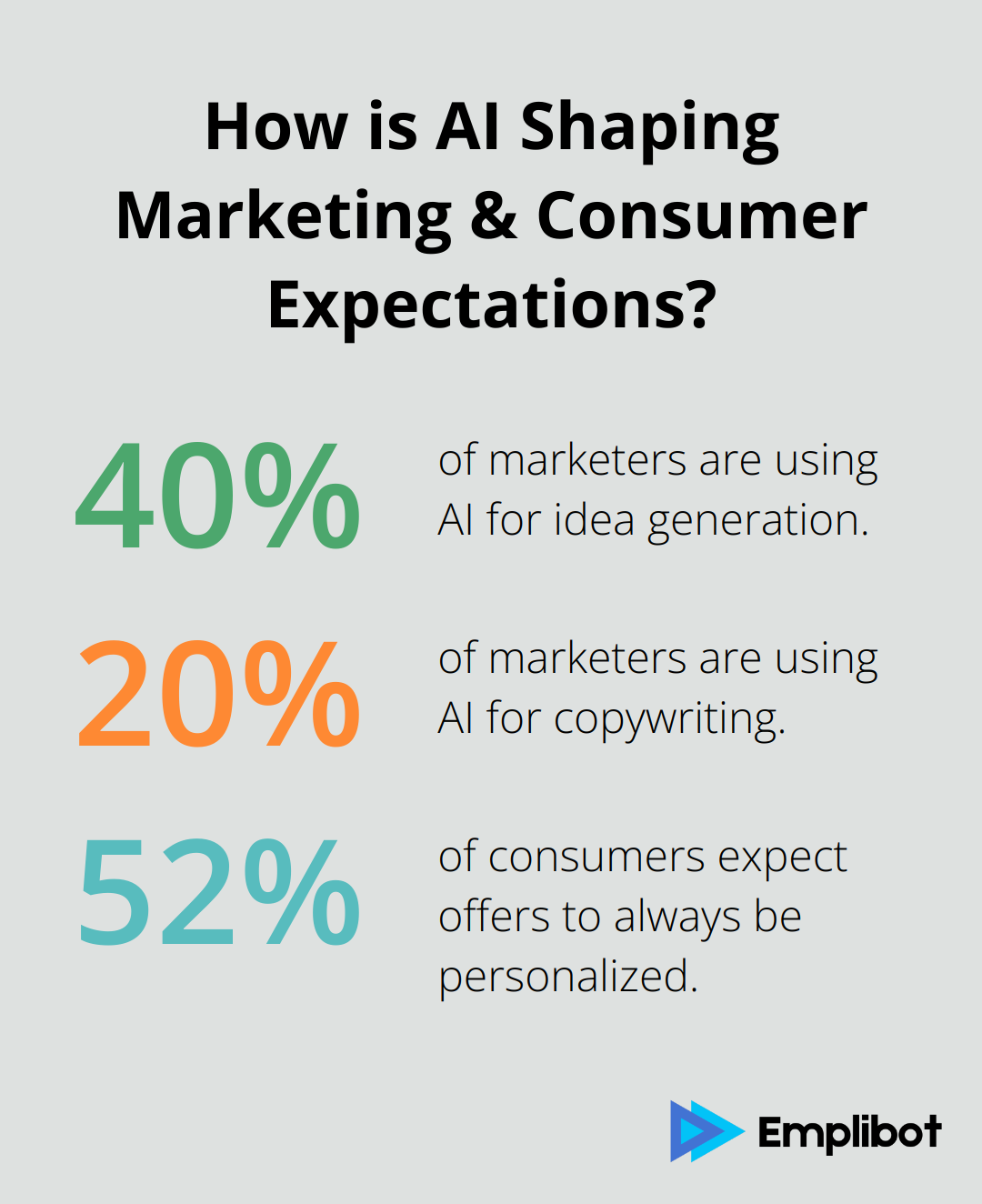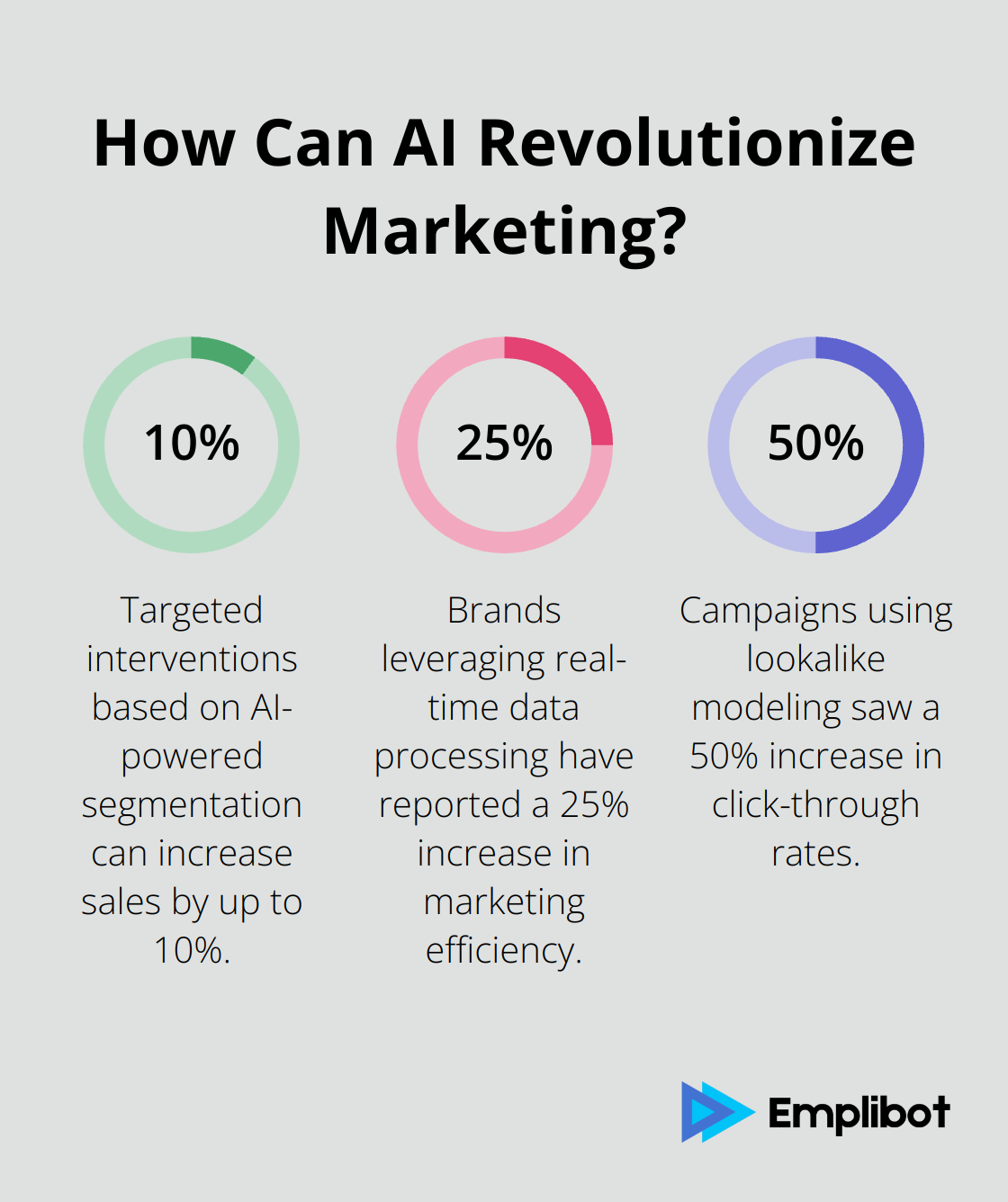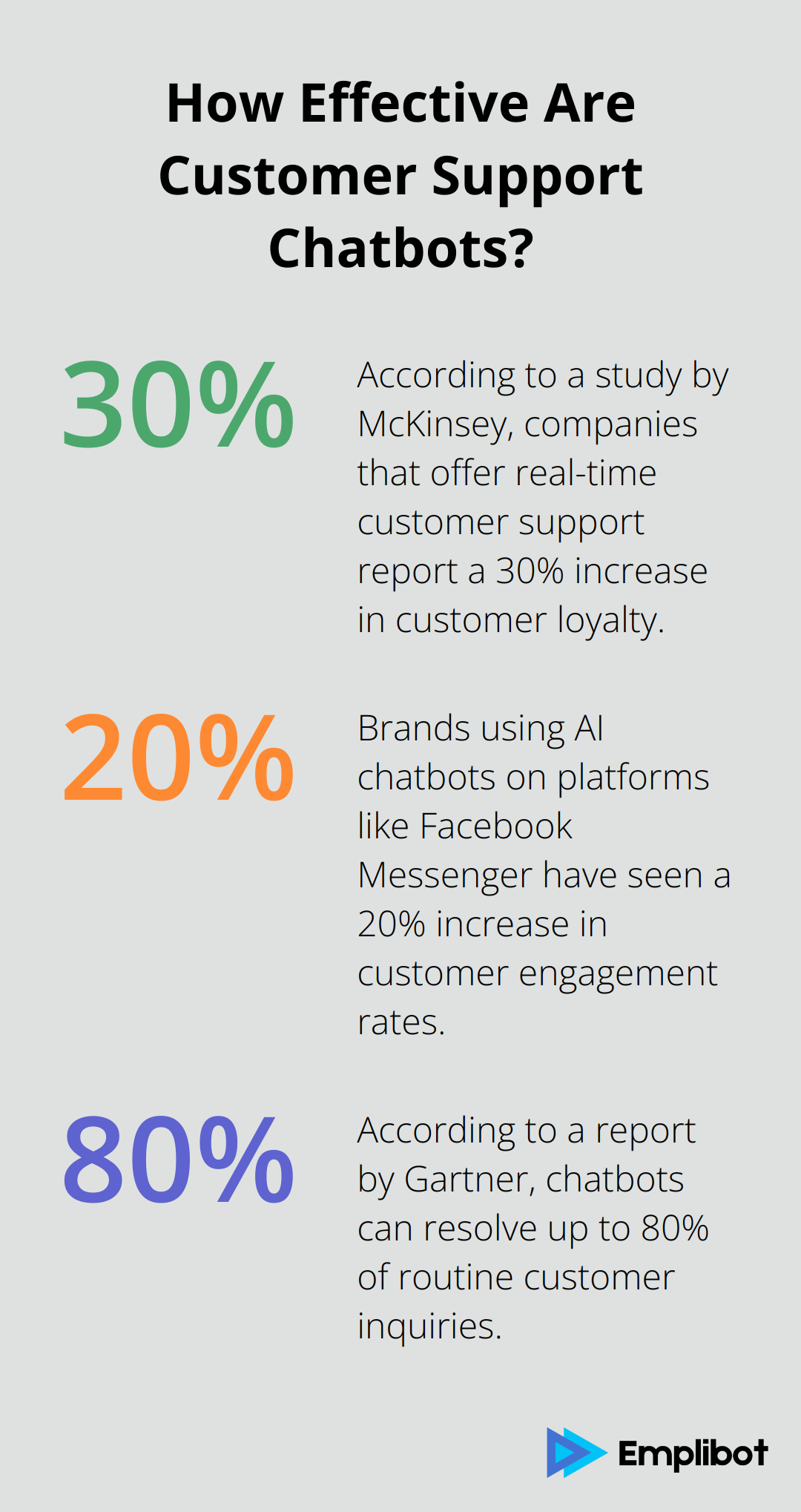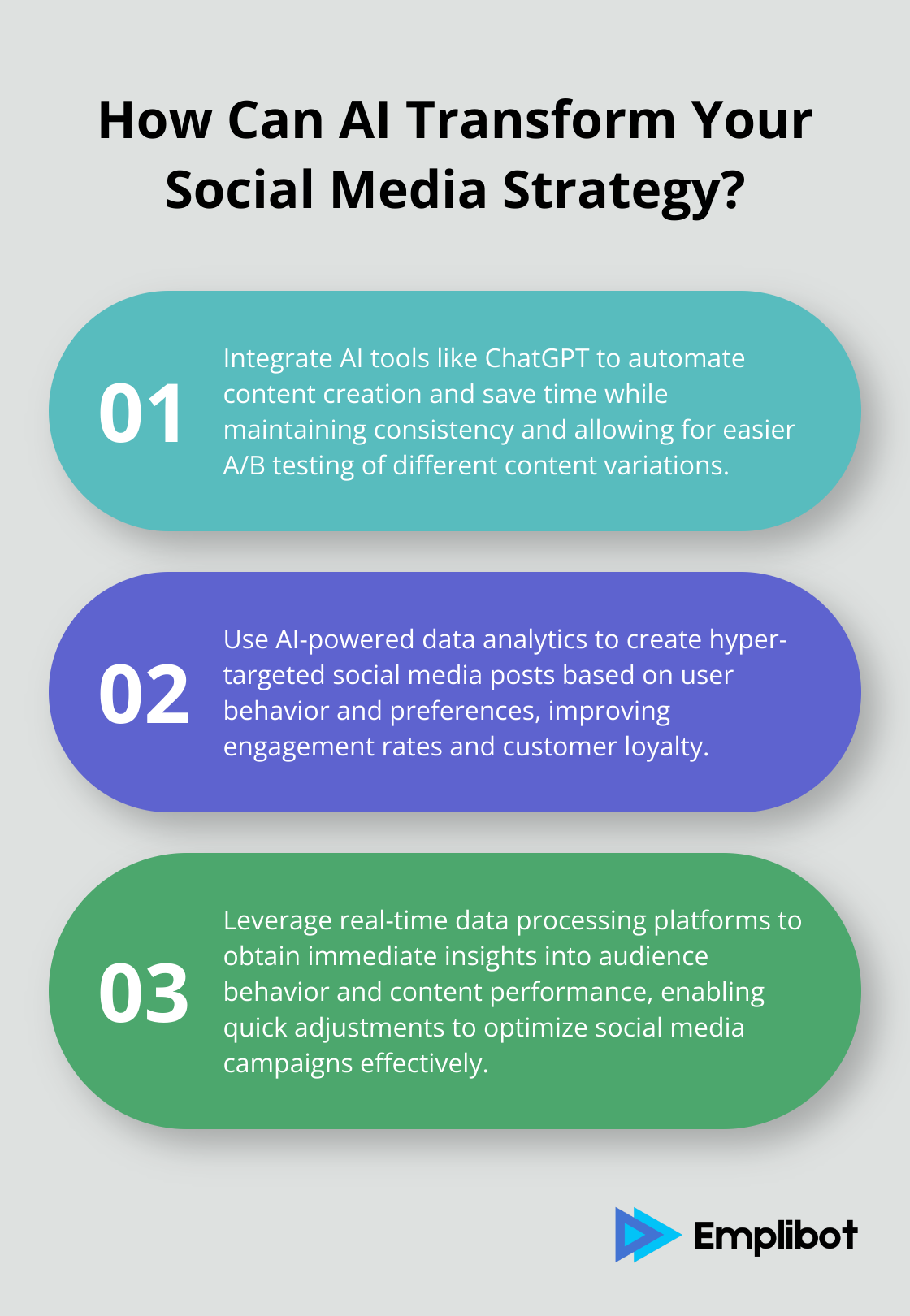AI is reshaping social media marketing in significant ways.
From automating content creation to enhancing customer engagement, the impact is profound.
At Emplibot, we have seen firsthand how AI-driven tools are transforming audience targeting and real-time data processing.
Let’s explore the key changes and trends that AI brings to social media marketing.
Contents
ToggleHow Is AI Changing Content Creation?
Artificial intelligence has drastically improved content creation on social media platforms by bringing automation, personalization, and predictive analytics into play. These advancements are not mere enhancements; they are game-changers.
Automated Content Generation
AI algorithms are adept at generating content at scale. Tools like OpenAI’s ChatGPT and Lately can create social media posts in seconds. According to HubSpot, a survey found that 40% of marketers are using AI for idea generation and 20% for copywriting. Automated content not only saves time but also ensures consistency. A/B testing different content variations becomes simpler and faster, allowing for efficient optimization. For practical application, integrating AI tools like these into your workflow can relieve stress and boost productivity.
Enhanced Personalization
Marketing strategies have shifted towards personalized content, and AI makes it seamless. AI-powered data analytics can segment audiences based on behavior and preferences, allowing for tailored content. A study by Salesforce shows that 52% of consumers expect offers to always be personalized. This is where AI excels by not only personalizing email or ad content but also tailoring social media posts. Tools that leverage machine learning can analyze user data to create hyper-targeted posts, increasing engagement rates and customer loyalty.
Predictive Analytics for Trending Topics
Staying ahead of trends is crucial for effective social media marketing. AI enables marketers to predict trending topics accurately. AI tools analyze vast amounts of data from various sources, identifying patterns and predicting what will be the next big thing in your industry. For example, predictive analytics tools can monitor hashtags and keywords, offering real-time insights. These insights help in crafting timely and relevant posts. Being early to tap into a trend not only positions your brand as a thought leader but also maximizes reach and engagement.

Incorporating these AI-driven approaches into your social media strategy can provide a competitive edge. AI’s ability to automate, personalize, and predict trends is revolutionizing the content creation landscape. For those looking to delve deeper into how AI can enhance content creation, AI tools for content production is an excellent resource.
How Does AI Improve Audience Targeting?
Artificial intelligence is a game-changer in audience targeting. From understanding audience behavior to processing data in real-time, AI offers marketers powerful tools to hone their strategies.
Behavioral Analysis and Segmentation
AI excels at breaking down complex audience behavior into actionable insights. Traditional segmentation methods often rely on demographics alone, but AI dives deeper. It analyzes user behavior, purchase history, and interaction patterns. According to a report by McKinsey, targeted interventions based on AI-powered segmentation can increase sales by up to 10%. Utilizing tools such as customer data platforms (CDPs) that incorporate AI can supercharge your segmentation efforts. These tools can categorize your audience into highly specific segments, which you can then target with tailored content.
Real-Time Data Processing
One of AI’s most significant advantages is its ability to process data in real time. This capability allows marketers to make quick decisions based on the latest information. Platforms that offer real-time analytics, such as Google Analytics Enhanced by AI, provide immediate insights into audience behavior, content performance, and engagement metrics. Forbes highlights that brands leveraging real-time data processing have reported a 25% increase in marketing efficiency. This immediate feedback loop can help you pivot your strategy instantly, optimizing your campaigns on the fly and improving overall effectiveness.
Lookalike Audience Modeling
Lookalike modeling is another area where AI proves invaluable. By analyzing existing customer profiles, AI can identify potential new audiences that exhibit similar behaviors and interests. This strategy can expand your reach more effectively than traditional targeting methods. A study by the Harvard Business Review showed that campaigns using lookalike modeling saw a 50% increase in click-through rates. Using tools like Facebook’s Lookalike Audiences or Google Ads’ Similar Audiences, marketers can scale their campaigns by targeting users who are most likely to convert.

AI’s impact on audience targeting is unmatched. The combination of deep behavioral analysis, real-time data processing, and lookalike modeling sets a new standard for how marketers can reach and engage their audiences. For more insights into how you can leverage AI for effective audience targeting, explore our guide on predicting customer behavior.
How Does AI Enhance Customer Engagement?
Artificial intelligence has redefined how businesses engage with their customers on social media. By integrating AI into customer engagement strategies, companies can offer quick, personalized, and effective support.
Chatbots and Virtual Assistants
AI-powered chatbots and virtual assistants have become indispensable tools for customer service on social media. These tools can handle a wide range of queries, providing instant responses that keep customers satisfied. According to a report by Gartner, chatbots can resolve up to 80% of routine customer inquiries. Brands using AI chatbots on platforms like Facebook Messenger have seen a 20% to 30% increase in customer engagement rates. Incorporating chatbots can offer round-the-clock support and free up human agents for more complex queries, improving the overall efficiency of customer service teams.
Sentiment Analysis
Understanding customer sentiment is critical in crafting effective engagement strategies. AI-driven sentiment analysis tools can scan social media comments, reviews, and posts to gauge public sentiment about a brand or product. A study by Forrester found that companies leveraging sentiment analysis saw a 15% improvement in customer satisfaction. These tools can identify negative sentiments in real-time, allowing companies to address issues promptly before they escalate. Implementing sentiment analysis can help businesses stay attuned to customer feelings and make data-driven decisions to enhance customer interactions.
Real-Time Customer Support
AI excels in providing real-time support, which is key for maintaining high levels of customer satisfaction. Real-time analytics tools can monitor ongoing interactions and alert customer service teams to potential issues, enabling immediate resolution. According to a study by McKinsey, companies that offer real-time customer support report a 30% increase in customer loyalty. AI tools can analyze customer interactions and provide insights to improve response times and accuracy. This instant feedback loop ensures that customers feel valued and heard, which is essential for building long-term relationships.

For an in-depth exploration of how AI can enhance real-time customer engagement, check out our article on real-time AI chat solutions. The benefits of AI in this area are undeniable, making it a vital component of any modern social media strategy.
Conclusion
AI is reshaping social media marketing in significant ways. The integration of AI has made a profound impact on content creation, audience targeting, and customer engagement. By automating content generation, enhancing personalization, and enabling predictive analytics, AI has transformed how marketers operate.

The key benefits of AI in social media marketing include improved efficiency, high-level personalization, and real-time insights. AI-driven tools streamline processes, making it easier to produce and distribute content consistently. AI also enables granular audience segmentation, allowing for more relevant and engaging interactions. Moreover, AI-powered tools such as chatbots and sentiment analysis provide real-time support and immediate feedback, which enhance customer satisfaction.
However, the challenges cannot be overlooked. Algorithmic bias and ethical considerations pose significant concerns. Additionally, the rapid evolution of AI necessitates continuous updates and adjustments to marketing strategies. Regulatory frameworks must also catch up to ensure responsible use of AI.
Looking ahead, the future of AI in social media marketing is bright. Trends like virtual influencers, automated video editing, and AI-driven customer insights will continue to elevate marketing strategies. As AI tools become more sophisticated, their application will expand, offering marketers new opportunities to connect with their audiences.
For those interested in automating their blogs with SEO-friendly content, Emplibot offers a seamless solution. Emplibot publishes SEO-friendly articles to your WordPress site 100% automatically, including keyword research, images, and internal linking. Explore more at Emplibot.
For further reading on AI’s impact, you might find insights in AI marketing useful.










 Rated Excellent 4.5
Rated Excellent 4.5